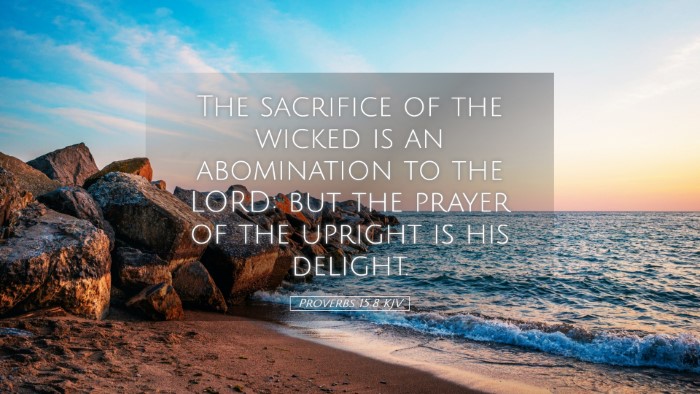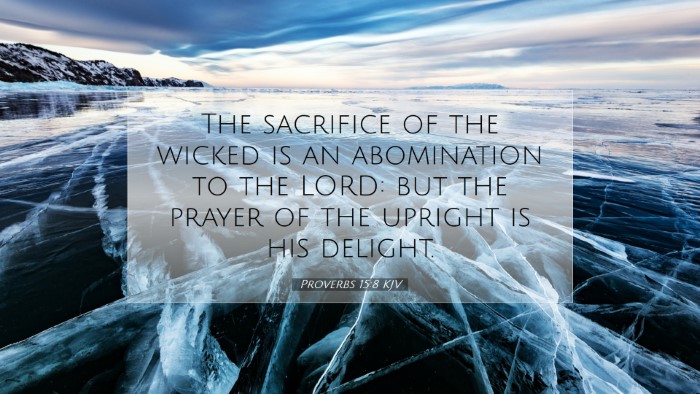Commentary on Proverbs 15:8
Proverbs 15:8 states, "The sacrifice of the wicked is an abomination to the Lord: but the prayer of the upright is his delight." This verse provides a profound contrast between the actions of the wicked and the righteous, shedding light on God's attitude towards them. Below is a synthesis of insights from various public domain commentaries, particularly from Matthew Henry, Albert Barnes, and Adam Clarke, which can serve as invaluable resources for pastors, students, theologians, and Bible scholars.
Divine Disposition Toward Worship
Matthew Henry emphasizes that the sacrifices made by the wicked—those who live in rebellion against God's commands—are utterly unacceptable to God. He interprets the ‘sacrifice’ as not only a literal offering but also as the broader notion of acts that are meant to please God but are rendered ineffective by the wickedness of the person making the offering. Henry asserts that God cannot be pleased with anything offered from a heart filled with sin. Instead, such sacrifices are an abomination to Him.
Albert Barnes reflects on the concept of sacrifice in relation to righteousness. He highlights that the term ‘sacrifice’ encompasses not only animal offerings but all forms of devotion. Barnes notes that while the wicked may perform religious acts, their insincerity, stubbornness, and lack of true repentance render their offerings worthless in the eyes of God. The essence of true worship is purity of heart, an idea that connects deeply with Jewish teaching that God desires truth in the inward parts (Psalm 51:6).
Prayer of the Upright
The latter part of the verse, which states that "the prayer of the upright is his delight," presents a stark contrast to the first half. Matthew Henry interprets 'the prayer of the upright' as reflective of genuine communion with God. He argues that prayer is inherently more valuable than sacrifice when it stems from a heart that seeks to align itself with God's will. Henry emphasizes that the upright person, who lives in accordance with God's standards, invites God's approval and finds favor in His sight.
Adam Clarke expands on the notion of prayer, stating it as a vital aspect of the believer’s relationship with God. Clarke argues that prayer ought to arise from a life committed to righteousness; thus, it carries weight and significance before God. The upright, a term signifying those who are innocent or morally right, engage with God in an intimate dialogue that reflects their trust and commitment to Him. Clarke also reinforces the idea that God delights in such prayers because they come from a heart that is aligned with His desires.
Theological Implications
The diverse interpretations of this verse by the various commentators lead to significant theological reflections:
- Worship Beyond Ritual: This verse challenges the notion that ritualistic acts can substitute for the sincerity of the heart. It underscores that one’s moral standing before God weighs more than the quantity or nature of religious observance.
- The Nature of True Righteousness: If ‘the upright’ are those who plead for mercy sincerely, it prompts reflection on what constitutes true righteousness. This suggests an active pursuit of holiness and continuous fellowship with God.
- God's Disposition: The dichotomy presented illustrates God’s preference for heartfelt communication over empty ritual. It evokes discussions on God’s justice, mercy, and the relational aspect of worship.
Practical Applications
For pastors, students, and theologians, there are several practical applications to consider:
- Integrity and Authenticity: Encourage congregants to seek authenticity in their worship. Their prayers, songs, and acts of service should stem from a genuine relationship with God.
- Teaching on the Heart of Worship: Focus on teaching that true worship is as much about the inward disposition as it is about outward actions, aligning with Jesus’ teachings on internal spirituality.
- Self-reflection: Encourage personal reflection to assess areas of life where one may perform religious acts without a true heart of worship.
Conclusion
In summary, Proverbs 15:8 encapsulates profound spiritual truths about the nature of worship and the essence of a life lived in alignment with God. The insights drawn from recognized commentaries provide a rich tapestry for understanding how God interacts with the offerings of the wicked versus those of the upright. It invites believers into deeper communion with God where genuine prayer emerges from a righteous heart.


